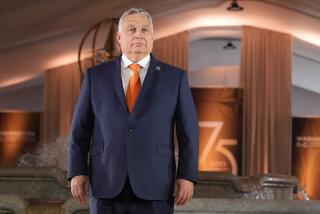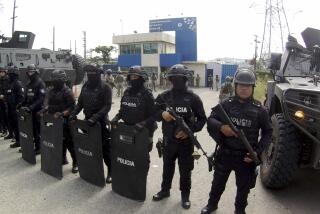Europe Envoys to Snub Marcos’ Inauguration : American Ambassador Also May Not Attend Ceremony, Diplomats Say; U.S. Embassy Silent
- Share via
MANILA — President Ferdinand E. Marcos’ international isolation increased visibly Thursday as top diplomats from the European Communities said that they plan to boycott his inauguration ceremony next week and that they expect that the United States will also do so.
Fifteen diplomats, representing the 12-nation European Communities, five European nations outside of that group and Japan, paid a joint call on opposition leader Corazon Aquino and told her their governments consider Marcos’ reelection questionable because of extensive fraud in the Feb. 7 vote.
“This election was won in a way that we have serious questions about,” said Netherlands diplomat Peter Palthe, who spoke for the group.
Palthe also said, speaking for just the 12 in the European Communities, “It is probable that none of the ambassadors will appear (at the inauguration).” He said nothing to indicate that lower-ranking diplomats would stay away.
Envoys for the five other Western European nations and Japan did not make their inauguration-day plans clear.
No U.S. Comment
A European diplomat said that American Embassy officials have privately indicated that U.S. Ambassador Stephen W. Bosworth also would shun the inauguration, scheduled for next Tuesday, and send a lower-ranking representative instead. A spokesman at the embassy refused to comment on the report.
The inauguration boycott is the clearest sign yet that a broad international consensus is forming against recognizing Marcos’ reelection as legitimate.
However, Palthe said that withdrawing diplomatic recognition entirely remains “out of the question.”
West Germany and Spain have called their ambassadors home in an apparent signal of their disapproval. The United States, Canada and New Zealand have also questioned the legitimacy of the election results.
Aquino, who maintains that she would have won the election if it had been conducted fairly, told the ambassadors that she intends to keep on with a campaign of protest against Marcos until the authoritarian president falls, aides said.
Marcos and his aides have reacted angrily to the mounting gestures of diplomatic displeasure. Marcos asked his foreign minister to inform other countries that he considers their actions “intervention in the internal affairs of our people.”
Private Ceremony?
U.S. diplomats believe Marcos may find the boycott so embarrassing that he will decide to hold his inaugural ceremony in private, instead of in the usual public gala, one American source said.
The Netherlands diplomat noted that no country except the Soviet Union has sent Marcos the customary message of congratulations on his reelection. The Soviet ambassador here congratulated Marcos on Wednesday.
But even the Soviet message was on a lower-than-usual level, since it came from Ambassador Vadim I. Shabalin rather than from the Kremlin’s leaders in Moscow.
“It was really only our ambassador’s personal congratulations, not the official congratulations of the state,” a Soviet Embassy official said.
Nevertheless, Marcos was sufficiently grateful that he praised the Soviet Union for “its position against intervention in our internal affairs” and said the Philippines will try to expand its trade with Moscow.
Japanese Visitor
The Soviet Union has worked steadily for several years to improve its relations with Marcos, despite the Philippine leader’s record of anti-communism.
Japan’s ambassador, Kiyoshi Sumiya, also visited Aquino but issued a more ambiguous statement afterward. Sumiya “knew of (Aquino’s) determination and perseverance regarding the presidency (and) hoped that no blood would be spilled on this beautiful land in the process,” the statement said.
Japan is the largest donor of foreign economic aid to the Philippines. In Tokyo, Foreign Ministry officials said they have postponed sending $183.3 million in project loans to the Philippines. The officials, however, did not say the postponement was due to disapproval of the Philippine elections, merely that the situation here is “confused.”
Aquino told the diplomats that she is grateful for any withdrawal of support for Marcos, and reiterated her rejection of a compromise with the president, aides said.
She specifically turned down the idea, floated by some diplomats, of “nullifying” the Feb. 7 election and calling another vote, presumably under fairer conditions.
Court Suit Filed
“Nullification assumes a parity between guns and fraud on the one hand and votes on the other,” she said. “Those who argue for it are really saying that I won the people’s vote . . . (but) that Marcos has the guns.”
Three opposition lawyers filed suit in Supreme Court on Thursday asking that the election be nullified because of the fraud. Marcos, in a statement issued by his office, said he welcomes the legal action because it will “give both sides a chance to present their cases.” The Supreme Court is dominated by Marcos appointees.
White House special envoy Philip C. Habib met Thursday with Aquino’s running mate, former Sen. Salvador Laurel, Philippine sources said. Habib met on Wednesday with Marcos’ running mate, former Foreign Minister Arturo Tolentino.
Laurel and Tolentino have both figured prominently in speculation about possible successors to Marcos if the ailing president ever decides to step down. Both refused to disclose the contents of their discussions with Habib.
The diplomats who visited Aquino included ambassadors or other envoys from Britain, France, West Germany, Italy, Spain, the Netherlands, Belgium, Denmark and Ireland, all members of the European Communities; Sweden, Norway, Finland, Austria and Switzerland, non-members, and Japan. European Communities members Greece, Portugal and Luxembourg endorsed the boycott action but had no representatives in Manila, Netherlands diplomat Palthe said.
More to Read
Sign up for Essential California
The most important California stories and recommendations in your inbox every morning.
You may occasionally receive promotional content from the Los Angeles Times.














